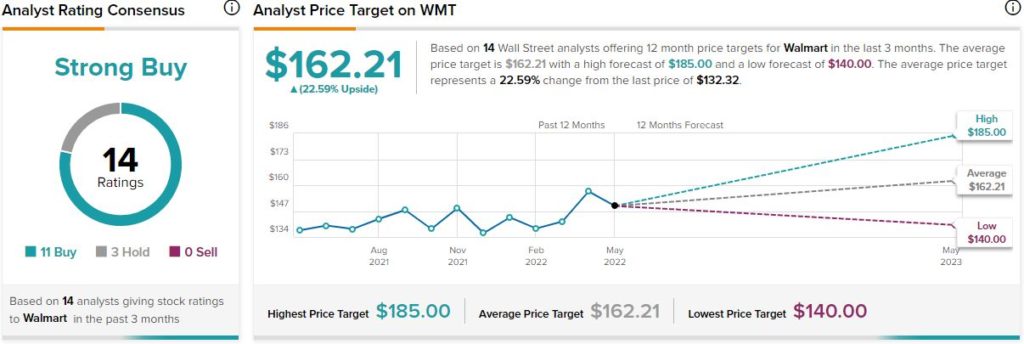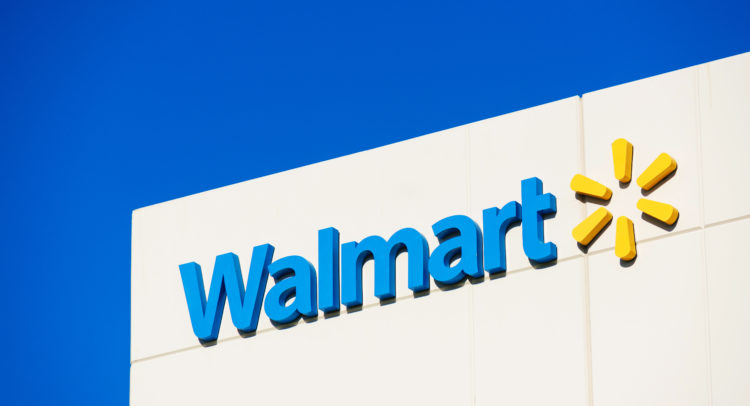Walmart (WMT) is one of the biggest names in discount retail around. It’s one of the biggest names in retail and grocery retail as well. However, even Walmart doesn’t emerge unscathed from inflation, as its latest earnings numbers showed. The company plunged 7% in premarket trading today and continued those losses into the day’s trading session. WMT is now down nearly 11%.
Despite the losses, I’m bullish on Walmart; if any company is going to survive spiking inflation, it’s going to be Walmart. If any company is going to survive anything short of full-out nuclear war, it’s probably going to be Walmart.
The last 12 months for Walmart shares were largely uphill until recently. After breaching $150 per share and briefly challenging $160 per share, the company slid back down to around $135. Oddly, this is about where Walmart shares traded this time last year.
The latest news, meanwhile, proved mixed for Walmart but sent investors running. The company posted $1.30 in adjusted earnings, which were worse than Refinitiv projections calling for $1.48 per share. Revenue, however, won out, coming in at $141.57 billion against Refinitiv’s projections of $138.94 billion.
As for the shortfall’s primary reason? Inflation. Sales were up, but so too were costs across the board. Same-store sales were up 3%, and online sales, as well as Sam’s Club sales, saw increases as well. With food costs up 9.4% and households spending 3% more but getting less, inflation is hitting Walmart hard.
Wall Street’s Take
Turning to Wall Street, Walmart has a Strong Buy consensus rating. That’s based on 11 Buys and three Holds assigned in the past three months. The average Walmart price target of $162.21 implies 22.6% upside potential.

Analyst price targets range from a low of $140 per share to a high of $185 per share.
Investor Sentiment is Turning on Walmart
Walmart may be well-positioned to survive a downturn, but don’t look for explosive results here. Walmart currently has a Smart Score of five out of 10 on TipRanks, which puts it at a perfect “neutral.”
It has just as much chance to outperform as it does to underperform. “Perform” may be the best way to describe a company that’s trading for almost as much now as it was a year ago.
Hedge fund involvement doesn’t look for any benefit here and has likely gone on to greener pastures. The TipRanks 13-F Tracker shows that hedge funds have once again substantially cut their connection to Walmart shares, cutting the total slightly less than half from just over 15.285 million in December 2021 to just over 7.999 million in March 2022.

Insider trading, meanwhile, is clearly sell-weighted. In the last three months, sell transactions have led buy transactions by 24 to 18. For the full year, meanwhile, sell transactions led buy transactions far and away, with 159 sell transactions against 61 buy transactions.
Meanwhile, retail investors—at least those who hold portfolios on TipRanks—are sticking around and buying in, if slightly. TipRanks portfolios holding Walmart are up 0.2% in the last seven days and up just under 0.1% in the last 30 days.
Walmart’s dividend history is solid in pretty much every sense. It’s stable, and it doesn’t increase much either. In the last three years, the quarterly dividend has been paid regularly but has only increased from $0.54 to $0.56.
Even Everyday Low Prices Look Expensive When You’re Broke
Walmart is running into a bit of a problem. Sales on low-margin items are brisk. Eggs, milk, and bread are doing quite well. However, fewer customers are buying clothes and electronics, which hits Walmart a bit.
In normal inflationary environments, Walmart tends to do better than most. It’s a bargain seller. People look for lower prices, and they often find them at Walmart. That shows why Walmart’s sales are up.
However, this is proving to be a seller’s market in just about everything, which hurts Walmart indirectly. It has limited ability to pass its costs on to customers because it’s invested heavily in being the “everyday low prices” store.
Walmart is also facing some difficult comparisons against last year, which was still very much impacted by pandemic spending. Whether it was stocking up to avoid potential lockdowns or supply shortages, people bought more in general. Now, people buy less but pay more for what they do buy.
Walmart does have two key advantages going into this market. The first is customer perception. Walmart is the “everyday low price” leader. Its marketing has been hammering this point home for years, if not decades outright.
All it really has to do to be the “everyday low price” store is just be lower than its competitors. Eventually, customers have to buy food somewhere. It may not be as much, but if they’re buying anywhere, it’s probably with Walmart.
The second is its sheer diversity of product lines. It’s got everything in Walmart itself, which represents a host of daily consumer needs that will be among the last expenses halted. Things like food, soap, and various toiletries; these markets are the last to go.
If they do, we have much bigger problems. Walmart also has the gas station operations, the Sam’s Club business, the growing healthcare operations, and plenty more.
Walmart is, therefore, in a solid position to sustain itself through a downturn and produce decent results, even as many companies implode from lack of business.
Concluding Views
Walmart’s excellent diversification is a solid point in its favor as we go into a historic inflationary environment. A potential recession afoot leaves a company focused on necessities in a much better position to produce results as well.
Throw in the fact that Walmart is trading at last year’s prices—well below even the lowest price targets—and that’s enough to make anyone bullish. Walmart may not produce huge results, but its sheer recession-beating power will make it a fairly safe investment worth considering.
Discover new investment ideas with data you can trust.
Read full Disclaimer & Disclosure









